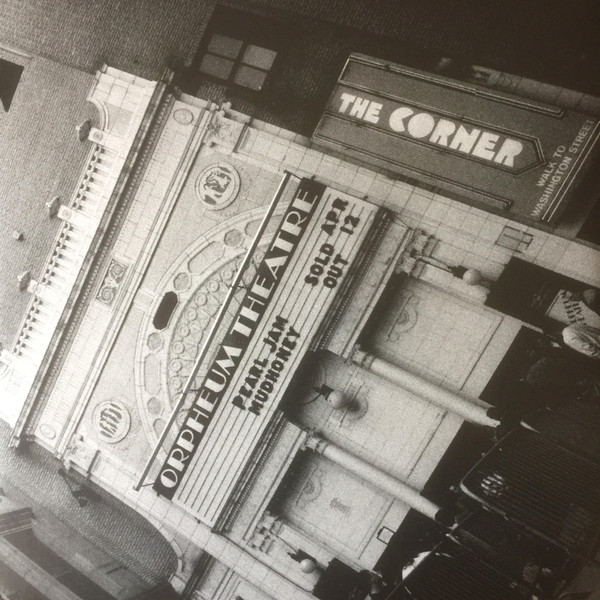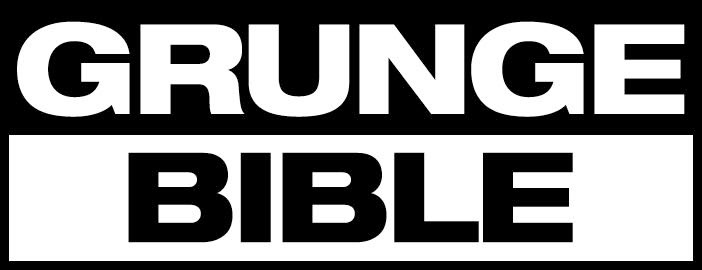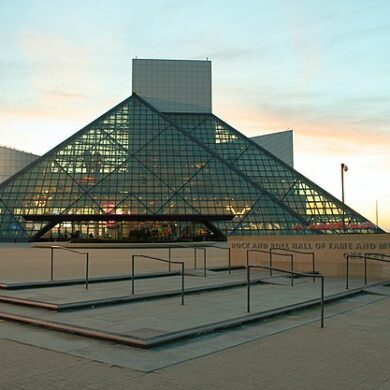Polish version below/Polska wersja niżej
The Grunge Bible is the best proof that this genre wasn’t just the voice of Generation X. It speaks for another ones too.
Grunge has been the greatest revolution in the history of rock music so far, its last game-changer. Although the worldwide “Seattle fever” lasted only a few years and it has been 3 decades already since it exploded, the spirit of the revolution is still alive these days. Grunge was called the voice of the Generation X. But that’s only a half right through. It turns out that 30 years later, subsequent generations identify with it the same way. And I think this is the best proof of how great, wonderful and important this music is. Actually, the whole culture – because after all, it wasn’t all about the music itself, not only.
Being younger than most albums of the genre, Chris Celona and Ethan Shaloway, founded The Grunge Bible in 2016. For 5 years of activity, they brought together a community of more than 300,000 people from all over the world. And this number is constantly growing
I asked Chris about the grunge phenomenon and what drew him personally to the genre. What else did we talk about? You will find out more in the interview below.
Magda: Eddie Vedder said: “I think music is the greatest art form that exists, and I think people listen to music for different reasons, and it serves different purposes. Some of it is background music, and some of it is things that might affect a person’s day, if not their life, or change an attitude. The best songs are the ones that make you feel something.” I also like the Dave Grohls quote: “That’s one of the greatest thing about the music. You can sing a song to 85,000 people, and they’ll sing it back for 85,000 different reasons”. What’s your story here? What got you into the grunge music?
Chris: Ed and Dave are completely correct here. I think we all listen to music because we can get our own unique and individual message out of it. The music becomes ours through that process. I listen to music to feel inspired. The lyrics of this genre spoke to me at a critical point in life and really served as a ‘soundtrack’ for such a formative period in my life. For that reason, it will always be important to me.
You experienced the grunge era after it came to an end And I would say that it’s amazing how this music affects the next generations. How still, after so many years, it is connecting people, all over the world. It seems like it wasn’t only the voice of Generation X, it speaks for a lot of younger people as well. What do you think – what caused this phenomenon? What’s so special about this music?
I think there is a lot of mystique surrounding this era because of the power of nostalgia, as well as the stature of the individuals of the era. You talk about someone like Cobain, or Cornell – they really have become interwoven in the fabric of that era, even outside of music. I think people my age and younger still identify with it for the same reasons that those during the era did – the music was able to express the world in such a way that made people feel something deeply personal.
You started The Grunge Bible in February of 2016. If someone told you 5 years ago, that it would have over 300 000,00 followers all over the world, would you believe it?
Absolutely not! It is absolutely a testament to the power of the genre and the desire for community that I think we all innately have. Ethan and I are just lucky enough to be a small part of it.
Not so small, I would say. The number of The Grunge Bible family is really impressive and it’s still getting bigger. You are doing an amazing job here. And except the posts, I love reading your comments, I even have my favorite one. Someone wrote under one of the posts: „I listen to Jar of Flies because I’m alone”. And you (or Ethan, I’m not sure which one of you answered) replied: „and I’m alone because I listen to Jar of Flies”. I really just love it, totally! This is the #storyofmylife. (laugh) What do you think – do we become what we listen to?
Hahaha! I think we all have confirmation bias in terms of choosing what we listen to – we seek out sad music when we’re sad, and happy music when we’re happy. So I think we are complementary to music, as it is complementary to us. I do think that the darker stuff from the era, Jar of Flies included, certainly has the power to linger in a potentially negative way. But I absolutely feel it is necessary to experience all emotions for a full experience as humans.
Fully agree on that. But don’t you think that in general, people do love sad songs? Much more than the optimistic ones?
Yes, I think so. And why? I think it is comforting – to know that others can empathize with you, or know that you share a common experience. There’s comfort in the presence of others who understand. Sad music makes us feel this presence and can make us feel less alone when we’re down.
Kurt Bloch – lead guitarist of Fastbacks and a member of The Young Fresh Fellows said that: „Touch me I’m sick is a perfect single. This and the Nirvana’s Love Buzz basically sum up all grunge and everything it was about.” At the same time Nils Bernstein – the publicist of Sub Pop – said: “I’m still surprised that people saw grunge as something deadly, dark, made of rainy weather. For me, it has always been a super fun, lively and optimistic group of people.” What does grunge mean to you? Is it just a loud, heavy, somehow depressive sound or do you see the other, fun side of it? And which side of it you prefer the most?
I think it is all of that! There is no one singular ‘grunge’ sound (besides Mudhoney!) in my opinion, and it is the sum of its parts. I think all sides are equally as important. They complement one another, and they all have a part to play in our experiences.
Let’s imagine that we can get into the time machine. If you could go for any 3 concerts, which one would you choose?
My favorite show from the era was Pearl Jam at the Orpheum in Boston, Massachusetts, on 12 April 1994. I would have loved to see Soundgarden around the time Badmotorfinger came out. Additionally, Mad Season at The Moore would have been special.
Oh, Mad Season would be also one of my first choices, for sure. Since we are going to publish this interview in a “special edition” of our online music magazine dedicated to the 30th anniversary of Nevermind and Ten albums, I need to ask you: are you more in Nirvana camp or Pearl Jam camp? Or maybe both, equally?
I have always felt a deep connection to Pearl Jam’s music, mainly due to the lyrical content and what it has meant to me throughout my life. I absolutely enjoy and appreciate Nirvana, but if I had to choose, I would choose Pearl Jam.

Last but not least, you started up The Grunge Bible podcast 8 months ago. And so far we have 40 episodes there. I hope that the next 400 are ahead of us. What are your plans for The Grunge Bible in the nearest future?
“What’s Next” for Ethan and I with Grunge Bible is a consistent conversation, and the answer always seems to be changing. It has been an entity in our lives for nearly five years now. Right now, we’re enjoying making the podcast, and I think we are always looking to move into additional areas that stimulate our creativity, and allow us to interact with community members.
I’m more than sure that you both have a lot of ideas and I keep my fingers crossed for all of them. You rock guys!
Grunge był jak dotąd ostatnią wielką rewolucją w historii muzyki rockowej. Jej ostatnim wielkim zrywem. I choć ogólnoświatowa “gorączka Seattle” trwała zaledwie kilka lat, a od jej wybuchu minęły już 3 dekady, duch tej rewolucji żywy jest po dziś dzień. Mówiło się, że grunge był głosem pokolenia X. Ale to tylko połowicznie prawda. Okazuje się bowiem, że 30 lat później, identyfikują się z nim kolejne generacje. I myślę, że to jest najlepszym dowodem na to, jak wielka, wspaniała i ważna jest ta muzyka. A właściwie cała ta kultura – bo ostatecznie nie o samą muzykę tu chodzi.
Młodsi niż większość albumów gatunku, Chris Celona i Ethan Shaloway, założyli The Grunge Bible w 2016 roku. Przez 5 lat działalności zrzeszyli społeczność ponad 300 tysięcy ludzi, z najróżniejszych zakątków świata. I liczba ta stale rośnie.
Zapytałam Chrisa o to, na czym polega według niego fenomen grunge’u i co jego osobiście przyciągnęło do tego gatunku. O czym jeszcze porozmawialiśmy? Sprawdźcie.
Magda: Eddie Vedder powiedział: „Myślę, że muzyka jest najwspanialszą z istniejących form sztuki. Ludzie słuchają jej z różnych powodów i służy ona różnym celom. Dla jednych będzie tylko tłem, dla kogoś innego może mieć ogromny wpływ na cały dzień, jeśli nie całe życie, może zmienić jego nastawienie. Najlepsze piosenki to te, które sprawiają, że coś czujesz”. Lubię też cytować Dave’a Grohla: „To jedna z najwspanialszych rzeczy w muzyce. Możesz zaśpiewać piosenkę dla 85 000 ludzi, a oni odśpiewają ją z 85 000 różnych powodów”. Jak wygląda to w Twoim przypadku? Co Ciebie wciągnęło w muzykę grunge’ową?
Chris: Ed i Dave mają tutaj całkowitą rację. Myślę, że wszyscy słuchamy muzyki, ponieważ możemy wydobyć z niej własny, niepowtarzalny przekaz. Dzięki temu procesowi staje się ona „nasza”. Ja słucham muzyki przede wszystkim po to, żeby się zainspirować. Teksty tego gatunku przemówiły do mnie w krytycznym momencie mojego życia i naprawdę posłużyły jako „ścieżka dźwiękowa” dla tak kształtującego to życie okresu. Z tego powodu grunge zawsze będzie dla mnie bardzo ważny.
Doświadczałeś ery grunge w okresie, kiedy ona w zasadzie już przeminęła. I powiedziałabym, że to jest naprawdę niesamowite, jak ta muzyka wpływa na kolejne pokolenia. Jak nadal, po tylu latach, łączy ludzi na całym świecie. Wychodzi na to, że był to nie tylko głos Pokolenia X, ale identyfikują się z nim także i kolejne generacje. Jak myślisz – co jest tego powodem? Co jest takiego szczególnego w tej muzyce?
Myślę, że w całej tej erze jest coś mistycznego, co wynika po części z siły nostalgii, ale też i z postawy jednostek tamtych czasów. Mówiąc o kimś takim jak Cobain czy Cornell widzimy, że oni naprawdę trwale wpisali się w tkankę tamtej epoki, nie tylko w sferze muzyki. Myślę, że ludzie w moim wieku i młodsi nadal identyfikują się z tą muzyką z tych samych powodów, z których identyfikowali się z nią ludzie w latach 90. – ta muzyka była w stanie wyrazić i opisać świat w taki sposób, że dotyka to naszych najgłębszych strun.
Założyłeś The Grunge Bible w lutym 2016 roku. Gdyby ktoś powiedział ci, 5 lat temu, że stronę będzie śledzić ponad 300 000 osób, z najróżniejszych zakątków świata, uwierzyłbyś w to? Spodziewałeś się takiego rozwoju sytuacji?
Absolutnie nie! Zdecydowanie jest to świadectwem potęgi tego gatunku, oddającego pragnienia społeczności, które, jak sądzę, wszyscy nosimy w sobie od urodzenia. Ethan i ja mamy po prostu szczęście być małą częścią tego wszystkiego.
Powiedziałabym, że nie taką małą. Liczebność „rodziny” The Grunge Bible jest naprawdę imponująca i wciąż przecież też rośnie. Oboje z Ethanem wykonujecie tu niesamowitą robotę. Poza treściami, które publikujecie, uwielbiam czytać też Wasze komentarze. Mam nawet swój jeden ulubiony. Ktoś kiedyś napisał pod jednym z postów: „Słucham Jar Of Flies, bo jestem sam”. A ty (albo Ethan, nie wiem, który z was akurat tu odpisywał) odpowiedzieliście: „A ja jestem sam, bo słucham Jar of Flies”. Genialne, totalnie! #storyofmylife (śmiech). Jak myślisz – czy stajemy się tym, czego słuchamy?
Hahaha! Myślę, że wszyscy mamy tendencję do odzwierciedlania swojego nastroju w tym, czego słuchamy – szukamy smutnej muzyki, kiedy jesteśmy smutni, i radosnej muzyki, kiedy jesteśmy szczęśliwi. Jesteśmy komplementarni wobec muzyki, a ona jest komplementarna wobec nas. Myślę, że te mroczniejsze nagrania z epoki, w tym Jar of Flies, z pewnością w jakimś stopniu mogą na nas oddziaływać w negatywny sposób. Ale zdecydowanie też uważam, że aby w pełni człowiekiem, musimy doświadczać wszystkich emocji, tych ciemniejszych także.
W pełni się z tym zgadzam. Ale czy to nie jest też trochę tak, że ludzie, w ogólnym ujęciu, po prostu kochają smutne piosenki? Dużo bardziej niż te optymistyczne?
Tak, tak myślę. A dlaczego tak się dzieje? Cóż, sądzę, że jest w tym coś pocieszającego – dobrze jest wiedzieć, że inni potrafią dzielić z tobą te same emocje, że mają podobne doświadczenia. Jest w tej obecności innych, którzy cię rozumieją, jakiś komfort. Smutna muzyka sprawia, że czujemy tę obecność, to zrozumienie i może dzięki temu czujemy się mniej samotni, gdy jesteśmy w dołku.
Kurt Bloch – gitarzysta Fastbacks i The Young Fresh Fellows powiedział: „Touch me I’m sick to singiel idealny. To i Love Buzz Nirvany w zasadzie podsumowują cały grunge i wszystko, o co w nim tak naprawdę chodziło”. Jednocześnie Nils Bernstein – publicysta Sub Popu – zaznaczył: „Wciąż się dziwię, że ludzie postrzegali grunge jako coś zabójczego, mrocznego, stworzonego z deszczowej, dołującej pogody. Dla mnie zawsze była to super zabawna, pełna życia i optymistyczna grupa ludzi”. Jak Ty postrzegasz grunge? Czy rzeczywiście jest to dla Ciebie głównie to głośne, ciężkie i w jakiś sposób depresyjne brzmienie, czy też może dostrzegasz tę jego drugą, zabawną stronę? I którą z tych stron wolisz?
Myślę, że grunge jest po trochu tym wszystkim! Moim zdaniem nie ma jednego brzmienia „grunge” (poza Mudhoney!), jest ono sumą wszystkich tych części. Myślę, że każda ze stron jest równie ważna. Wszystko to wzajemnie się uzupełnia, każda z tych stron ma tu istotną rolę do odegrania. Każda jest kluczowa, aby doświadczanie tej muzyki, mogło być kompletnym.
Załóżmy, że możemy wsiąść się do wehikułu czasu, który zabierze nas gdzie tylko będziemy chcieli. Gdybyś mógł, za sprawą tej magicznej maszyny, wybrać się na 3 dowolne koncerty, to byłyby to…?
Moim ulubionym koncertem z tamtych czasów jest Pearl Jam w Orpheum w Bostonie, w stanie Massachusetts, 12 kwietnia 1994 roku. Chciałbym zobaczyć również Soundgarden mniej więcej w czasie, gdy wyszedł Badmotorfinger. I Mad Season w The Moore Theatre, to byłoby z pewnością coś wyjątkowego.
Och, koncert Mad Season na pewno byłby również jednym z moich pierwszych wyborów. Jako, że mamy zamiar opublikować ten wywiad w „specjalnym wydaniu” naszego magazynu, poświęconemu 30-leciu albumów Nevermind i Ten, muszę zadać Ci to trudne pytanie: czy jesteś bardziej w „obozie” Nirvany czy w „obozie” Pearl Jam? A może w obu obozach w równym stopniu?
Zawsze czułem głęboką więź z muzyką Pearl Jam, głównie ze względu na zawarte w ich utworach teksty, ale też przez to, jak wiele znaczyła dla mnie przez całe moje życie. Oczywiście lubię i bardzo doceniam Nirvanę, ale gdybym miał wybierać, wybrałabym Pearl Jam.

8 miesięcy temu uruchomiliście podcast The Grunge Bible. Jak dotąd ukazało się prawie 40 odcinków. Mam nadzieję, że przed nami kolejnych 400. Chciałabym zapytać na koniec – jakie macie plany na dalszą działalność TGB w najbliższej przyszłości?
„Co dalej” jeśli chodzi o The Grunge Bible to kluczowe pytanie i temat nieustających rozmów pomiędzy mną i Ethanem, a odpowiedź zawsze wydaje się zmieniać. Od prawie pięciu lat TGB jest istotą naszego życia. Aktualnie mamy frajdę z robienia podcastu. Ale zawsze staramy się też szukać dodatkowych obszarów, które stymulować będą naszą kreatywność i pozwolą nam wchodzić w integrację ze społecznością The Grunge Bible.
Jestem więcej niż pewna, że oboje macie tu jeszcze w zanadrzu wiele ciekawych pomysłów. Za wszystkie trzymam mocno kciuki. You rock guys!



